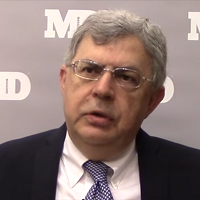Article
A Year in Review: All About Multiple Sclerosis
Author(s):
Between daily news and conferences around the United States and Europe, it was a busy year in multiple sclerosis research.

From a celebrity diagnosis to innovative potential treatments, this was quite the year in the world of multiple sclerosis (MS). The editors at MD Magazine covered the day-to-day news as well as attended various MS-focused conferences, including:
- 2016 Americas Committee for Treatment and Research in Multiple Sclerosis (ACRTIMS 2016) Forum in New Orleans, Louisiana
- 68th American Academy of Neurology Annual Meeting (AAN 2016) in Vancouver, British Columbia, Canada
- 2016 Annual Meeting of the Consortium of Multiple Sclerosis Centers (CMSC 2016) in National Harbor, Maryland
- 32nd Congress of the European Committee for Treatment and Research in Multiple Sclerosis (ECTRIMS 2016) in London, United Kingdom
Read on to catch up on the key MS findings over the past year, and stay up-to-date with the MD Magazine multiple sclerosis condition center. Don’t forget to connect with us on Facebook, Twitter, Instagram, and LinkedIn!

Professor Alan Thompson, MD, the University College London Faculty of Brain Sciences, Institute of Neurology, Department of Brain Repair and Rehabilitation, is a highly respected neuroscientist. A lover of music, art, and good wine, he splits his time between work in London and enjoying the sun and sea in Barcelona, Spain.
But there was a time he felt like Alice entering Wonderland. That was the day when, as a student at Trinity College, Dublin, Thompson opened a door to a basement lab.
>>> Continue reading this story here

It can be difficult to precisely measure how well therapies are working for patients with progressive multiple sclerosis (MS). Researchers at the National Institutes of Health in Bethesda, Maryland, reported at the ACTRIMS Forum in New Orleans, Louisiana, on the effectiveness of 58 measurements of patients’ disease status.
Those measurements included clinical, electrophysiological, optical coherence tomography, and MRI outcomes.
>>> Continue reading this story here

Editor’s Note: Country music artist, Clay Walker, is well-known for his hit songs “She Won’t Be Lonely Long” and “Live Until I Die.” But a lesser-known fact about the star is that 20 years ago he was diagnosed with a relapsing form of multiple sclerosis (MS) at the age of 26. MD Magazine caught up with Walker at the 2016 Annual Meeting of the Consortium of Multiple Sclerosis Center (CMSC) in National Harbor, Maryland.
MD Magazine: What were your symptoms leading up to diagnosis?
CW: Some of the ones that most people have, like my right leg and both my legs kind of went numb, and they just felt like they were asleep. And I was walking down some stairs going to play basketball with the band and I was just kind of laughing and joking around about how my feet felt asleep. And then…
>>> Read the exclusive interview with Clay Walker here

A recent study found that while a low-fat, plant-based diet did not result in improvements in brain magnetic resonance imaging (MRI) of multiple sclerosis (MS) patients, it did bring about less fatigue, better body mass index (BMI) measures, and improved metabolic biomarkers.
The study was undertaken to find out how a very low-fat, plant-based diet would affect brain MRI, clinical and metabolic outcomes, quality of life, and fatigue in patients with relapsing-remitting MS. Although both patients and clinicians are interested in dietary interventions, few studies have addressed questions of how or whether such interventions would be helpful.
>>> Continue reading this story here

"Since the 2015 playoffs, I've been struggling to understand what was going on with my body. Again during the past few weeks, it felt like something wasn't right," reads the official statement issued by the NHL’s Carolina Hurricanes on behalf of player Bryan Bickell. "Obviously this is a bit of shock for my family and me, but I am hopeful I will be able to return to the ice and continue playing the game that I love."
Bickell will be taking time away from hockey to determine his course of action after being diagnosed with multiple sclerosis (MS).
>>> Continue reading this story here

The US Patent and Trade Office ruled to invalidate the patents held by Teva on a novel multiple sclerosis (MS) treatment. Glatiramer acetate (GA), sold in a 40mg injectable version as Copaxone, is a drug thought to alter the immune processes that trigger MS relapses, though it is not necessarily an immunosuppressant.
The challenge was brought by rival pharmaceutical producer Mylan. Though glatiramer acetate has been produced and sold generically in daily 20mg injectable doses for the past year, Teva has held exclusive rights on the thrice-weekly 40mg version. Two of their patents were invalidated in the case, with a decision on a third patent expected this week. Mylan’s argument is that a dosage amount of a drug isn’t worthy of exclusive distribution. An appeal from Teva is likely inevitable.
>>> Continue reading this story here

Scientists are working to identify factors that can accurately predict outcomes for patients with relapsing remitting multiple sclerosis (RRMS).
The authors begin by saying, “early determination of clinical, magnetic resonance imaging (MRI), and/or biological markers that are prognostic for long-term outcomes would be valuable, to enable management strategies tailored to the needs of individual patients.” They add that currently no such measures have been shown to be prognostic factors on a consistent basis.
>>> Continue reading this story here

For many years there were no approved treatments for patients with primary progressive multiple sclerosis. Recently, a concerted effort has been made to change that and get this patient population the help they so badly need.
Suhayal Dhib-Jalbut, MD, from Rutgers University, who serves as the President of the Americas Committee for Treatment and Research in Multiple Sclerosis (ACTRIMS) discussed work being done in this area during the organization's annual meeting in New Orleans, Louisiana.
>>> Watch the exclusive interview with Suhayal Dhib-Jalbut, MD, here

An ultraviolet chemical tool has been developed that has the ability to observe and control inflammation. It will allow scientists to study immune response and may one day work to treat inflammatory diseases while sparing healthy tissue.
Researchers from Cornell University used chromatin-modifying enzymes including histone deacetylases (HDACs) in order to develop a strategy to regulate, observe, and control the HDAC inhibitors.
>>> Continue reading this story here

There are various disease-modifying treatment (DMT) options for patients with relapsing-remitting multiple sclerosis (RRMS). But how much do neurologists and patients agree on the first-line course?
Efficacy, safety, tolerability, and convenience are all factors to take into consideration when choosing treatment for any health condition. A collaborative team analyzed this topic as it applies to RRMS and revealed their findings in a poster session at the 2016 Annual Meeting of the Consortium of Multiple Sclerosis Center (CMSC) in National Harbor, Maryland.




